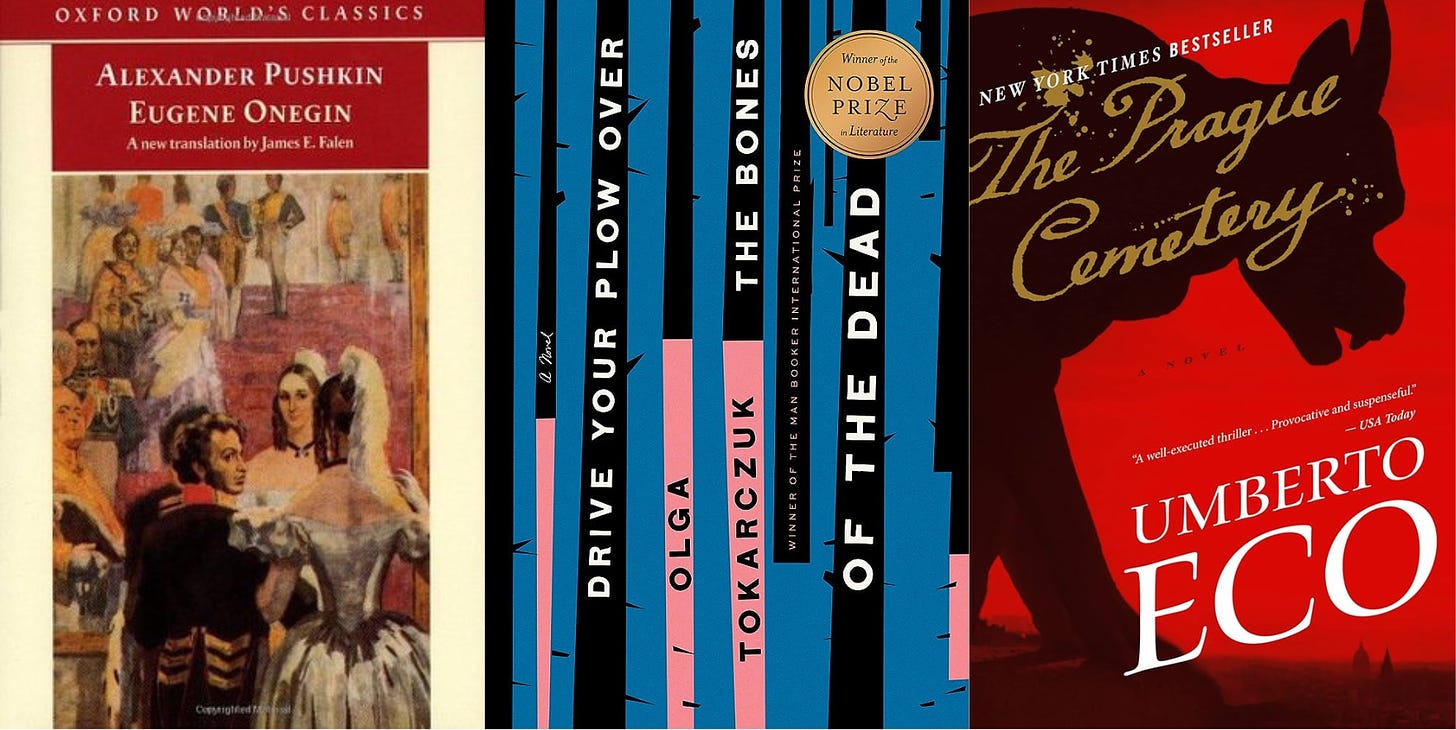When I first moved to New York I had a job as a teaching assistant at a summer program where we lied to kids and told them there was a future for them in journalism. It was a strange experience on a couple levels and the whole operation was run by people who had no idea what they were doing and should not have been entrusted with other people’s children, but it was worth it for some of the people I got to meet and work with.
During one of the four two-week terms I TA’ed a creative writing class taught by an editor at The Believer. Of course I picked up the latest issue and read it so I could compliment it and say I’d love to contribute hint hint. I remember I told him how I liked Nick Hornby’s Stuff I’ve Been Reading column and how that was the kind of thing I’d like to do.
James laughed. “Maybe when you write as many bestsellers as he has then people will care,” he said. That was the end of that.
I hadn’t thought about that conversation in years until the other day when it occurred to me that with these newsletters I finally gave myself permission to do my own Stuff I’ve Been Reading. The idea had been lurking somewhere in the back of my mind for half a decade before presenting itself as a way to impart some regularity on my publishing schedule. Except instead of doing it for a magazine, with editors and colleagues, I’m doing it here, for free! Does anyone want to give me a job?
The Prague Cemetery, Umberto Eco, 2010
Umberto Eco is an inspiration. He reinvented himself several times over throughout his career, beginning as a medievalist before branching into semiotics and then synthesizing his fascinations to produce novels like The Name of The Rose and Foucault’s Pendulum, immensely popular novels that are drenched in the classics and a reverence for every step humanity has taken on the long road to understanding. I’ve read four of his books and heartily recommend three of them—this one is the hardest sell.
Published six years before then end of his life, The Prague Cemetery was his second-to-last novel. It tells the story of Simone Simonini, a 19th century Italian who specializes in forging documents. Traumatized by early childhood stories told by his grandfather about the monstrous and bloodthirsty Jew, Simonini is a virulent antisemite. Buyer be warned, committing to this book means committing to passages where Simonini works himself up and starts raving about the treachery and usuriousness of the perfidious Yid. Eco doesn’t endorse these views of course; his intent is to show the shallowness of the bigoted mind—the way it circles the same themes endlessly, delighted to rehearse its hate and settle on simple answers rather than think expansively.
Thanks to his skill with documents, Simonini ends up working with various secret services, spying first for the church and later for the French authorities once he relocates to Paris. His job is to uncover plots and conspiracies to overthrow Napoleon III and advance democratic rule. How better to uncover plots than to invent them? In the course of this work he pens various pamphlets, originally plagiarized from popular fiction, that purport to recount the grand meeting where the hidden masters of the world discussed their plans for global domination. The original version features Jesuit priests meeting in Prague’s Jewish cemetery but as Simonini goes along plagiarizing himself again and again, the Jesuits drop away and are replaced by a cabal of Jewish rabbis. Simonini ends up playing important behind the scenes roles in the Dreyfus Affair and his writings ultimately become the basis for the Protocols of the Elders of Zion.
It’s nasty stuff. Eco sets himself the difficult task of rendering it from Simonini’s mind, where it’s all normal. I don’t think the gambit quite pays off. Because Simonini is essentially a dullard incapable of feeling wonder, his wild escapades end up rendered flatly. He experiences his life as a series of incidents none of which matter or carry any significance above any other, which makes him capable of recounting honestly the horrid things he’s done but also drains them of much of their excitement. I understand the intention here: conspiracism functions as a creative outlet for a fundamentally broken and empty person. But there’s the rub: it isn’t much fun to be Simonini and it isn’t much fun to be around him either.
Eugene Onegin, Alexander Pushkin, 1833
Pushkin, the headwaters of the Russian literary tradition and a writer who exposes how limited my expertise really is. Pushkin enjoys a status akin to Shakespeare or Homer in his native country, a puzzling fact when he’s read in translation and the work is…fine? He’s considered one of history’s most untranslatable authors due to some alchemy between the lightness of his verse, his authorial voice, and his subject matter. Nabokov produced a highly literal translation of Eugene Onegin along with four volumes of commentary on the poem, though I’ve read neither.
I read James Falen’s translation, which, deviating from Nabokov, takes more freedom with the words in order to preserve Pushkin’s rhyme scheme. Eugene Onegin is a novel in verse, composed entirely of 14-line stanzas as the paragraph. It follows the titular character, a familiar figure to fans of the Russians, a disaffected young aristocrat who smirks at society and wastes his time with frivolities. This is one of my favorite type of guys. I respond to Stavrogin in Demons, Pechorin in Lermontov’s A Hero of Our Time, it’s even Prince Andrei during certain sections of War & Peace.
I don’t have a strong position on these types of translation decisions. Generally I go for the more “accurate” version at the expense of the rhyme (that dichotomy is a simple fiction, of course) but in this case I was glad to read a version that emphasizes the poetic side of the text. Because the novel is a lark—both plot and character exist at an absolute minimum. Pushkin’s narrator digresses constantly into various flights of fancy, meditations on the world and society, and, early on, a lengthy speech about how he enjoys ladies’ feet. There are five-ish concrete plot events in the story.
Now maybe there’s just something wrong with me, but the downside to this flowy, rhyming translation is that it just slides right off my brain. So often, as I was reading, the rhythm of the line would lull me into a sort of hypnotic, semiconscious state where I continued reading in some sense, moving my eyes across the page, without absorbing any of it. Thinking back, when I try to recall specific quotations I come up empty. Maybe this is related to how I find almost all song lyrics basically unintelligible—do I have a language processing disorder?
Drive Your Plow Over The Bones Of The Dead, Olga Tokarczuk, 2009
Man oh man I love this book. Like the other two this month it’s a story defined by its narrator and her singular voice. In this case that’s Janina Duszejko, an old Polish woman who lives year-round in a vacation town and watches over the summer homes through the winter. She is a mystic of sorts, deeply committed to astrology and connected to animals and the natural world. She sees things differently than those around her; she processes everything in the most metaphysical terms and experiences life as an astonishing interplay of spirit and matter. There is no book here without her.
The plot, such as it is, concerns a series of grisly deaths that begin occurring in the neighborhood, first her poacher neighbor she calls Big Foot, then the police Commandant, and several others. I really couldn’t have cared less about the mystery behind these killings but they make for good scaffolding to bring out Janina’s ruminations. Take this passage, from early in the story after she and her other neighbor Oddball find Big Foot’s body and Oddball insists they dress him up nicely for the coroner:
By the time Big Foot was lying there in his Sunday best, his face had finally lost all human expression—now he was a corpse, without a doubt. Only his right index finger refused to submit to the traditional pose of politely clasped hands but pointed upward, as if to catch our attention and put a brief stop to our nervous, hurried efforts. “Now pay attention!” said the finger. “Now pay attention, there’s something you’re not seeing here, the crucial starting point of a process that’s hidden from you, but that’s worthy of the highest attention. Thanks to it we’re all here in this place at this time, in a small cottage on the Plateau, amid the snow and the Night—I as a dead body, and you as insignificant, aging human Beings. But this is only the beginning. Only now does it all start to happen.”
A sensation I’m forever chasing is what I experience when I read a line, a paragraph, that shifts something in my mind. It’s deeply pleasurable but almost alarming, so nearly physical is the sense that something has been dislodged deep in my consciousness, opening a crack to who knows what. This passage did that to me, and it’s far from the only one in the book. Tokarczuk has that gift, to write a sentence that brings about the world anew.





